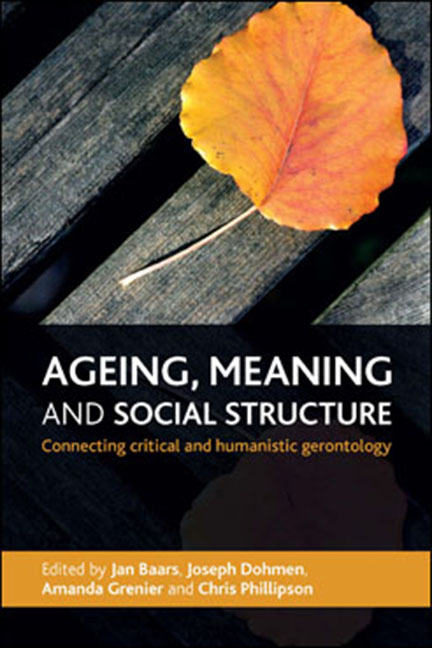Book contents
- Frontmatter
- Contents
- Notes on contributors
- Acknowledgements
- one Introduction
- two Connecting meaning with social structure: theoretical foundations
- three My own life: ethics, ageing and lifestyle
- four Rethinking agency in late life: structural and interpretive approaches
- five Dementia: beyond structures of medicalisation and cultural neglect
- six Self-realisation and ageing: a spiritual perspective
- seven Social ability or social frailty? The balance between autonomy and connectedness in the lives of older people
- eight Critical perspectives on social work with older people
- nine Community-based participatory action research: opportunities and challenges for critical gerontology
- ten Commentary: contingent ageing, naturalisation and some rays of intellectual hope
- Index
seven - Social ability or social frailty? The balance between autonomy and connectedness in the lives of older people
Published online by Cambridge University Press: 07 September 2022
- Frontmatter
- Contents
- Notes on contributors
- Acknowledgements
- one Introduction
- two Connecting meaning with social structure: theoretical foundations
- three My own life: ethics, ageing and lifestyle
- four Rethinking agency in late life: structural and interpretive approaches
- five Dementia: beyond structures of medicalisation and cultural neglect
- six Self-realisation and ageing: a spiritual perspective
- seven Social ability or social frailty? The balance between autonomy and connectedness in the lives of older people
- eight Critical perspectives on social work with older people
- nine Community-based participatory action research: opportunities and challenges for critical gerontology
- ten Commentary: contingent ageing, naturalisation and some rays of intellectual hope
- Index
Summary
Introduction
Social relationships constitute an important resource in daily life. For this reason people who are embedded in a network of meaningful personal relationships generally enjoy a higher level of wellbeing than those without such a network. This applies in particular to primary relationships with spouses and family, but social relationships in a broader sense also have a positive influence on feelings of wellbeing. Yet the ability to maintain such relationships may be affected by broader changes affecting society. These may drastically alter the structure of daily life, granting more freedom in some areas while at the same time increasing the demands placed on individuals. The more personal competencies people have, the more capable they are to be of shaping their lives in the way they want. They are also more likely to succeed in maintaining meaningful and supportive networks and taking advantage of these when necessary. Wellbeing is greatest when people succeed at finding a balance between individual autonomy and independence on the one hand, and connectedness with others on the other. Such balance enables people to fully enjoy the individual freedom of late modernity but at the same time feel safe in the face of limitations and adversity. It is also crucial for dealing with problematic situations and circumstances with which people are confronted, and which tend to happen more often as people age.
This chapter examines the extent to which involvement in a meaningful social network has enriching consequences both for individuals in general and for their chances of ageing well. The chapter first considers why meaningful relationships have a positive effect on personal wellbeing and quality of life. Second, the social environment of late modern society is reviewed along with the possibilities for social integration under these new social conditions. Third, the personal networks of Dutch older adults are described, the changes that are occurring in these networks, the role of major life events and the importance of social competencies when dealing with such events. Fourth, the chapter examines the role of personal competences and social networks. Finally, a concluding section draws together a number of remarks about ageing well in contemporary society.
- Type
- Chapter
- Information
- Ageing, Meaning and Social StructureConnecting Critical and Humanistic Gerontology, pp. 119 - 138Publisher: Bristol University PressPrint publication year: 2013

